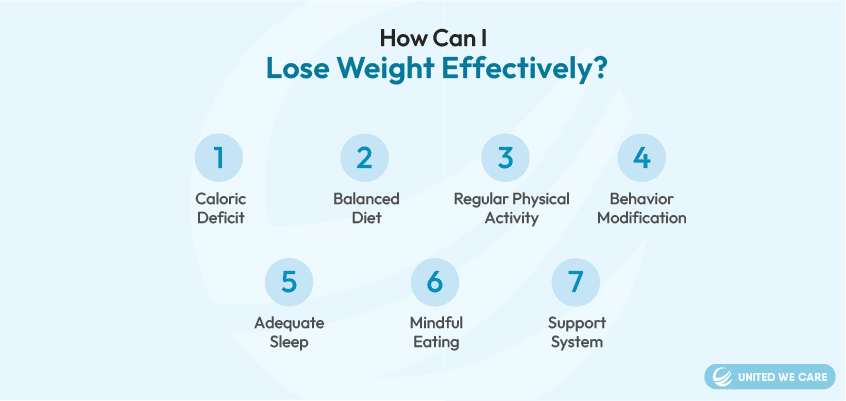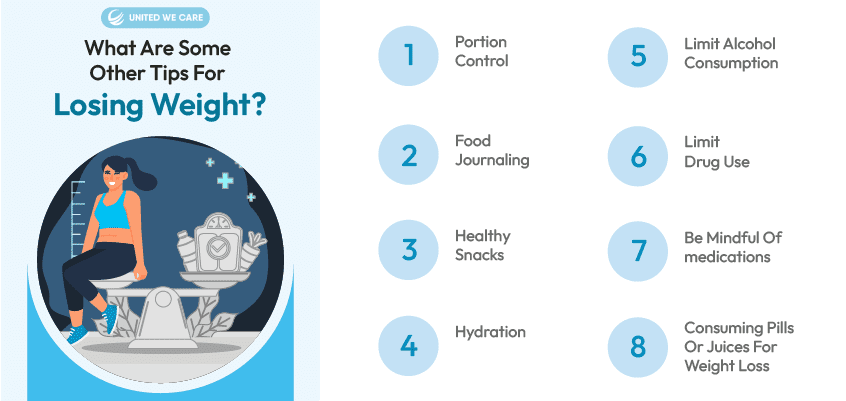Introduction
I was always a plump child. Growing up, when that plumpness became fat and from fat to obesity, I don’t quite know. Like me, I’m sure losing weight is a common goal for many. Whether it is to improve health and well-being or to look toned, fitness has become a part of everyone’s lives, even if some people are not able to cope. Many different and new techniques for losing weight have come up on the market these days. From diets to different forms of exercise to machines, there’s so much you can do. In this article, let’s find out why you should lose weight and what are some of the dos and don’ts for your weight loss journey.
“Weight loss doesn’t begin in the gym with a dumbbell; it starts in your head with a decision.” – Toni Sorenson [1]
What are the Benefits of Losing Weight?
Before starting with my weight loss journey, whenever a doctor or my parents would tell me to lose weight, I would ask why I should do that and how I love myself the way I am. However, losing weight has numerous benefits [2]:
- When you lose weight, most of your chronic illnesses can get taken care of, like hypertension, heart disease, type 2 diabetes, etc.
- When you start losing weight, even your cholesterol and blood pressure levels can start going down. With the weight loss, your bad cholesterol levels will also start shedding, making you less prone to heart disease and stroke.
- When you lose weight, your joints and muscles will give you blessings, trust me. You’ll be able to move more freely with much lesser body aches and risk of osteoarthritis.
- You will feel more and more energetic as you keep losing weight. And then, you can easily enjoy some other physical activities, like playing badminton or rock climbing.
- Losing weight will help you drop the weight from your mind as well, and your mental health will also improve. You’ll have an increased sense of self-worth, and even your symptoms of anxiety and depression start going down.
- Do you know how babies sleep? So peaceful, right? That’s what your sleep will become. Peaceful! Even your sleep apnea can go away with the weight going away.
- Weight can overpressure the reproductive organs, causing fertility issues. So, dropping weight can help you improve your chances of conception. Both men and women can see an increase in fertility rates.
- When you lose weight once, re-gaining it will not be so easy. So you can say goodbye to weight-related issues for good.
How Can I Lose Weight Effectively?
Since I have been on the path of weight loss for more than 20 years now, let me share some strategies that worked for me [3]:
- Caloric Deficit: Diet and workout go hand in hand. The food we eat gets converted into energy. That energy is calculated by using ‘calories.’ So when we burn more calories than we eat, we start reducing weight. We can do that by checking the amount of food we are eating and tracking our calorie intake.
- Balanced Diet: Since childhood, I have been told to eat a balanced meal with fats, proteins, carbohydrates, etc. In my weight loss journey, I understood that even more. So what you can do as well is add fruits, vegetables, lean proteins, whole grains, unsaturated fats, etc., to your diet. Also, cut down on sugar intake, processed foods, and fried items.
- Regular Physical Activity: During my weight loss journey, I have tried every kind of physical activity there is for weight loss – aerobics, Zumba, HIIT, yoga, etc. What worked best for me was a combination of brisk walking for 45 minutes and strength training for 45 minutes. I do it daily, but you can find what works best for you. But keep in mind that you should work out for at least 60 minutes 3-4 days a week.
- Behavior Modification: I used to be someone who would eat anything and everything and binge-eat between meals as well. When I recognized these patterns, I was better able to control them or work on them. I’m sure you have such patterns also. Identify them so that you can stop overeating. You can even take help from a professional who can help you with that. At United We Care, you can find such coaches who can help you.
- Adequate Sleep: When we sleep, our mind and body are able to recover themselves. So sleeping for 6-7 hours can help you to recover physically and mentally. That way, both your mind and body would not crave food so much, and you can lose weight.
- Mindful Eating: Usually, I would eat food while watching television, and then I used to be glued to the phone. So I bared put my mind to what I was eating. But, when I started earring slowly, noticing each bite I was having and savoring it, I started noticing that I wasn’t eating as much as I used to.
- Support System: Throughout the journey, I’ve had friends and family members supporting me and pushing me away from any temptations. If you have any of such people, then ask them to help, or else you can join a support group for weight loss, and they will motivate you enough.
What Are Some Things To Avoid When Trying To Lose Weight?
Over the last 20 years, I know exactly what doesn’t work while trying to lose weight [4]:
- Do not go for crash diets. Not eating properly for days will only make your health bad. It cannot help you lose weight in the long term. In fact, you can harm your system so much that losing weight can become difficult for the rest of your life.
- You might feel that you should limit an entire food group, like no carbohydrates or no fats. Understand, no balanced diet means more harm. These food groups are important in some moderation.
- If you eat food while being distracted, like watching TV or being on the phone, you can overeat and not know where your hunger stops.
- Eating processed and frozen foods all the time is the worst thing you can do for yourself. These foods have high calories and low nutrient levels.
- Some people proudly say, “I’m on a liquid diet.” If you have too many sugary drinks like juices, energy drinks, soft drinks, etc., you are consuming empty calories that will not help you.
- You don’t work out. Not even a walk for 0 minutes.
- You don’t sleep on time or get up on time.
- You stress-eat. Basically, you eat to cope with problems and issues.
Know more about How Can False Promises Kill You?
What Are Some Other Tips For Losing Weight?
Here are some additional tips for weight loss [5]:
- Portion Control: Begin by understanding that you might be eating a lot more than you need. So, you can practice mindful portion control. For that, you can start using smaller plates and bowls. You can even start measuring the amount of you you’re eating.
- Food Journaling: You can start keeping track of what you’re eating. You can use a food diary or even use mobile applications. These apps will even tell you the number of calories you should consume and what you are having. That way, you can have personal accountability.
- Healthy Snacks: While eating healthy, you can feel hungry more quickly. So you can substitute unhealthy snacks with nutritious snacks like fruits, vegetables, nuts, yogurt, etc. That way, you can feel full and even get the right nutrients.
- Hydration: One of the most common mistakes we make is not having enough water. Water is important for you to control your hunger and improve your overall health. You must start consuming 3-4 liters of water in the day.
- Limit Alcohol Consumption: Usually, when we drink, we tend to have more fried food. Anyway, alcoholic drinks have more sugar and calorie content. So limit your alcohol intake or choose low-calorie options.
- Limit Drug Use: Someone around you might have told you that using drugs like marijuana, cocaine, etc., can help you in losing weight. Some drugs make you very hungry, and in general, also, they are quite harmful to your body.
- Be Mindful of Medications: Sometimes, your doctor may not have any option, but you give you medications and substances that can eventually make you gain weight. So, maybe you can ask your doctor about it for alternatives or take the necessary precautions.
- Consuming Pills Or Juices For Weight Loss: Some companies have created weight-loss pills and juices which you can consume. Although most of them are harmful and only contain chemicals, some might be made from natural weight-reducing herbs and substances. But, check with a doctor or professional before consuming any such pills or juices.
Read more about Why Fat Shaming Actually Leads to Weight Gain?
Conclusion
Losing weight is one of the most hyped-up aspects around us. If you are starting your weight loss journey, there are certain habits you would have to change. Eat healthy, work out regularly, have enough water, and sleep on time. By losing weight, you can improve your mental, emotional, and physical health. But, all of it is only possible if you are willing to make a few sacrifices. If you understand the importance, I’m sure you will do it.
If you want to lose weight and need help, contact our expert counselors or explore more content at United We Care! At United We Care, a team of wellness and mental health experts will guide you with the best methods for well-being.
Read more about Discover The Ultimate Exercise Routine To Melt Away Belly Fat
References
[1] “Weight Loss Retreat | Best Places | Get in Shape | Benefits,” Retreats. https://lightstaysretreats.com/retreats/weight-loss/
[2] M. C. Dao, A. Everard, K. Clément, and P. D. Cani, “Losing weight for a better health: Role for the gut microbiota,” Clinical Nutrition Experimental, vol. 6, pp. 39–58, Apr. 2016, doi: 10.1016/j.yclnex.2015.12.001.
[3] D. L. Swift, N. M. Johannsen, C. J. Lavie, C. P. Earnest, and T. S. Church, “The Role of Exercise and Physical Activity in Weight Loss and Maintenance,” Progress in Cardiovascular Diseases, vol. 56, no. 4, pp. 441–447, Jan. 2014, doi: 10.1016/j.pcad.2013.09.012.
[4] H. A. Raynor and C. M. Champagne, “Position of the Academy of Nutrition and Dietetics: Interventions for the Treatment of Overweight and Obesity in Adults,” Journal of the Academy of Nutrition and Dietetics, vol. 116, no. 1, pp. 129–147, Jan. 2016, doi: 10.1016/j.jand.2015.10.031.
[5] C. E. Collins, “Dietary Strategies for Successful Weight Loss and Maintenance: More Evidence Required,” Journal of the American Dietetic Association, vol. 111, no. 12, pp. 1822–1825, Dec. 2011, doi: 10.1016/j.jada.2011.09.016.












